Speaking in Draft: We Quit Theatre
Speaking in Draft is an interview series in which staff writer Nathaniel Hanula-James speaks with some of the artistic visionaries shaping Canadian theatre today. In a mixture of light-hearted banter and deep dives into artistic practice, this column invites artists to voice nascent manifestoes, ask difficult questions, and throw down the gauntlet at the feet of a glorious, frustrating art form.
Gislina Patterson and Dasha Plett just don’t quit.
Under the aegis of their collective We Quit Theatre, this Winnipeg-based dynamic duo creates work that shatters formal expectations, deconstructs the Western canon, and embraces the uncertainty and intimacy that live performance makes possible. This past January, We Quit presented three pieces in the Cabaret space at Buddies in Bad Times in Toronto: 805-4821, a trans coming-out story recounted via overhead projector that combines personal narrative, Hamlet, and the CW television series Riverdale; i am your spaniel, a dizzying exegesis of queerness and capitalism in A Midsummer Night’s Dream; and Passion Play, in which the pair improvises erotic retellings of Bible stories. You can imagine my delight when I was able to meet with We Quit over Zoom to discuss their collaboration, as well as their thoughts on what needs to change in Canadian theatre with regard to process, community, and class.
The following interview has been lightly edited for length and clarity.
First of all, I want to say thank you for changing my whole view and conception of Riverdale. I don’t think I’ve looked at Cheryl Blossom the same way since I saw 805-4821. What pop culture is giving you life right now?
Gislina Patterson (GP): A week ago Dasha spent the whole week in bed watching the reality show Below Deck. I wasn’t quite as committed, but that is a really inspiring television show.
Dasha Plett (DP): I think what’s so interesting about the Below Deck franchise is that it’s about the people who create fantasies for the ultra-wealthy, but [it itself is] a fantasy, because it’s reality TV and it’s this weird spectatorship of people at work.
GP: Reality TV is something I’m paying attention to right now, because it doesn’t really have authorial intent, so you can extrapolate a lot from it, whatever is on your mind. I feel like Riverdale was like that in a way because it also didn’t have much of an authorial intention, so there was so much stuff you could pull out.
DP: Reality TV highlights two of my favorite things, one of which is clunky narrative shapes. I love a narrative shape that doesn’t cohere to a five-act structure. I think it takes you into realms of feeling that you cannot get to otherwise. My other [favourite] thing that’s great about reality TV is that it’s all about editing, and I love to edit. The only way you can create a narrative is by leaving things out. Sometimes when [I] find out the things the editors chose to cut, it totally recontextualizes things in a way that resonates with what my own process often involves: using personal stories or subject matter and then crunching it down into something that’s deliverable in a theatrical format.
In terms of editing, there’s so much collage in your work of different source material. Looking at the bibliography at the back of the script for i am your spaniel, I’m like — this is a feast! Does that joy in editing factor in?
GP: The version of spaniel that ended up being what we did, the process was really like collage. Making the [latest] version, I spent a few months writing a lot of stylistically different things on different subjects. During our rehearsal process we were like, okay, maybe this part should go here and this part should be rewritten to be in this voice. We found the shape by collaging a lot of different drafts and different kinds of writing together.
DP: I think 805 is a really interesting example of a piece where I would say probably 80 percent of the text that was generated never will see the light of day. I do think that once you start editing, that’s where the writing really begins. Now I say that, and also we have started to explore, ‘What if we broke that rule entirely?’ with projects like Passion Play, which are totally improvised and which revel in the messiness and humiliation of the first draft, with the knowledge that there is no editing process after.
Now that you’re moving into more improvised experiments like Passion Play, what are you finding in that new form?
GP: I tend to have a didactic approach in a lot of my writing. I like to make myself really clear. It was scary, a little bit, to know that we were going to do something that I wouldn’t be able to control. We wanted to make something that wasn’t as dense, where people could tune in and tune out and take from it what they wanted.
DP: There are two things about [that project] that I’ve been thinking about a lot lately. One is about the relationship between audience, performer, and performance. In a play, the performer knows what’s going to happen next and the audience doesn’t. I’m interested in performances where that convention doesn’t exist: where the relationship of the performer to the performance is a lot more like the audience’s relationship to it, not knowing where it’s going.
[Also], while Passion Play isn’t overtly political in the way some of our other work is, a thing I keep thinking about as we perform it is the way that Christofascism is rapidly emerging as this huge political force. The association by the far right — and increasingly liberals — between trans people and sexual perversity is getting closer and closer. To me, Passion Play is a move from talking about politics to doing politics. We don’t reveal all of that context explicitly, but that is ticking away in the background for me when we do that show.I’d love to know how this collaboration began.
GP: Because my parents both work in theatre (laughing), I’m a nepo baby. I grew up feeling I wanted to pursue theatre as my work. An accepted idea [at that time] was that in order to be an actor, you couldn’t alter your body in any way. There was this strong sense that if you wanted to be employable you had to maintain a neutrality, which obviously doesn’t exist, and also implies whiteness and heterosexuality.
At the same time, everyone is always talking about [how] theatre is radical and powerful. Receiving that [contradictory] information so much caused me to be pretty repressed, and I think [to] delay exploring transition.
When I met Dasha, I was in a place of feeling disillusioned, but not knowing what the way forward would be. If I wanted to let go of some of those ideas, [I was worried about whether] there were people who would be willing to go there with me. It felt like Dasha was someone that I could start to do that with: not just let go of those things, but also make not doing those things a central part of how we worked.
A big thing I’ve found in working with [Dasha] is that we’re both interested in process without rushing toward production. That’s something I wanted: to find space to allow ideas to develop without just constantly pushing things out and producing things.
DP: I think the other thing that’s interesting about our work together is that we’re just always talking. Normally, in the development process, you have to get everyone together in the room, but we’re always in the room together. That creates a very fun, slippery dynamic in terms of what developing a project means. Increasingly, projects that we’re doing are coming out of casual conversations or a joke somebody tells. I think that way of working is probably more akin to an artist duo in a performance art context or a fine arts context.
GP: I think it would be possible to have a theatre ecology that supported that kind of collaboration in a wider way. I think that also has a lot to do with not pushing toward producing. [There needs to be] space to just talk with people and be with people and share ideas without being like, ‘We’re doing a reading, we’re doing a workshop, we’re presenting in three weeks.’
DP: As we all know, the industry is in crisis! So maybe some of that time will be created through the fact that we can’t be chasing gigs all the time because there aren’t gigs to chase. I think about conversations that I’m having with my colleagues when I’m freelancing, [that] feel increasingly like they’re taking on a more radical tone. People are ready to have tough conversations about this industry, about the kind of art we want to make and the kind of art we don’t want to make.
I’m so glad that you started talking about theatre ecology because that’s something I wanted to ask you about. If you were to publish your manifesto tomorrow for the future of theatre in so-called Canada, what would that look like?
DP: It’s a shifting thing, but if I had to answer that question today I would say that, as an industry, we need to seriously grapple with our ideas of what excellence means, because they’re creating — among other things — a pretty massive class issue. We’ll talk about every vector of oppression, but we won’t talk about money. It’s the knife in our back right now that we can’t seem to pull out.
I would [also] say that, in order to advance as an art form, we have to, in a pretty radical way, commit to the freedom of oppressed peoples. Something that I’ve found very troubling lately [is that] we talk so much about theatre being a universal artform, and yet when our colleagues in the Freedom Theatre in the Jenin refugee camp in Gaza are imprisoned by a colonial regime, we’re quiet. That, to me, is unconscionable — and it makes me realize that maybe we’re all better actors than I thought we were, because we’ve been lying to each other this whole time about what we think theatre really is and how it’s this universal language. If we really believed that, I think we’d be acting differently.
It’s time for theatre to man up. (Laughs.) As a transsexual woman, that’s what I have to say about that.
GP: I think a big struggle is that theatre institutions are really tied to wealth. They’re generally in expensive buildings and they have to pursue wealthy donors, and the tickets have to cost a certain amount, or so they say. The $60 to $120 ticket is a basic limiting function of what can actually get done and what can actually get made. What I’m constantly hearing is that things need to be programmed that the audience will like, and if they don’t like it then they might not come back. I think that’s a pretty limiting idea, even of the group of people who have $60.
What a lot of theatres [with] their own buildings have to offer — I’m stealing this from Dasha — is a class experience. There are a lot of artists and audiences [who aren’t] comfortable, and often [aren’t] safe, in those spaces.
There’s also a relationship between that and gentrification. Arts institutions are funded in neighbourhoods to contribute to gentrification. I know that’s extremely pronounced in Winnipeg. There’s a great book called Stolen City by Owen Toews about Winnipeg and racial capitalism that touches on some of this stuff. I wish I’d read it six years ago so I could have given a copy to every new artistic director as they moved to Winnipeg, because it lays everything out so clearly.
It seems to me that one of the excuses we use to facilitate so many of these things is this dude named William Shakespeare. Two of your pieces have really exploded both his work and the man behind it. What’s it like to argue with Shakespeare for you?
GP: I think Shakespeare is a useful tool to talk about theatre, especially in Canada, because theatre workers and audiences often know a lot about Shakespeare and are interested in Shakespeare. There’s a shared base of knowledge, meaning his plays are a good way to think about and talk about why theatre is the way it is, what it does, and how it affects us.
I was talking to my parents about this the other day, actually. We were talking about what it does if you adapt or add things, or take things away, from a Shakespeare play to make it feel a little less icky. I’m curious about: Why can’t we just let it be icky? I wonder about allowing ourselves to sit in the problems of it, [whether there’s] some value [in] trying to understand the underlying subtextual ideas in these plays that we watch and produce over and over. What are the implicit or inherent things we’re saying with what we do?
In an interview with J. Kelly Nestruck in the Globe and Mail, you named a bunch of the folks who inspire you, including Frances Koncan, Hassaan Ashraf, and Jeanne Randolph. What about those artists feeds your own work?
DP: Frances gave me my start in theatre. When they lived in Winnipeg, before they were as well known as they are, they would just produce their own plays. It was always in a DIY venue, and it was often with people who either didn’t work in theatre or were just starting. One of my favourite things about Frances’s writing is that ideas and styles and scenes proceed in a logical manner the way hyperlinking from one internet article to another is logical.
GP: We could just talk about Frances for like 20 minutes.
DP: Jeanne Randolph is this amazing woman who does these wild performance lectures. She’s been a prolific amateur photographer throughout her life. So she takes a suitcase of slides she’s taken, and she randomly puts a bunch of them into a slide carousel. Then the lecture is her clicking through the slide carousel, not knowing what’s going to happen next, not knowing if a slide will be upright or upside down, and then lecturing on modernism or some sort of critical theory or psychoanalytic concept. She often will drink Dr. Pepper and eat Cheezies, if I’m remembering correctly, through the performance.
Jeanne was the vocalist of Hassaan Ashraf’s project Satan’s Chew Toys, which only played a few gigs, but looms incredibly large in my creative imagination. It was this jam band where the band would start playing, and then Jeanne would start monologuing. I think that Hassaan exemplifies that spirit of, ‘What if we made something based on our relationships with each other and not how much an audience might like it?’
My closing question is, did anyone text you at the end of 805?
DP: Okay, I’ll say it in print. 805-4821 is my real phone number. People do get in touch.
The first time we did the show in Winnipeg, I made these little [handmade] tickets. I scrawled [my number] on them with a little heart. Months later, someone texted me, “Who is this?” I texted back. It turned out someone had come to the show, and then months later found this piece of paper in her bag that had a phone number and a heart on it, and worried/wondered if she was being swept up in some sort of wild romance. [She] had forgotten that it was the title of the show. We worked it out and she still sometimes talks about what an exciting experience that was for her.
Thank you so much for this conversation! Truly, this has blown my mind.
DP: It’s been a really nice conversation to have.
GP: These conversations are so interesting and valuable and generative. It’s really cool to have this kind of [discussion] without ending it with, ‘please come see our play.’

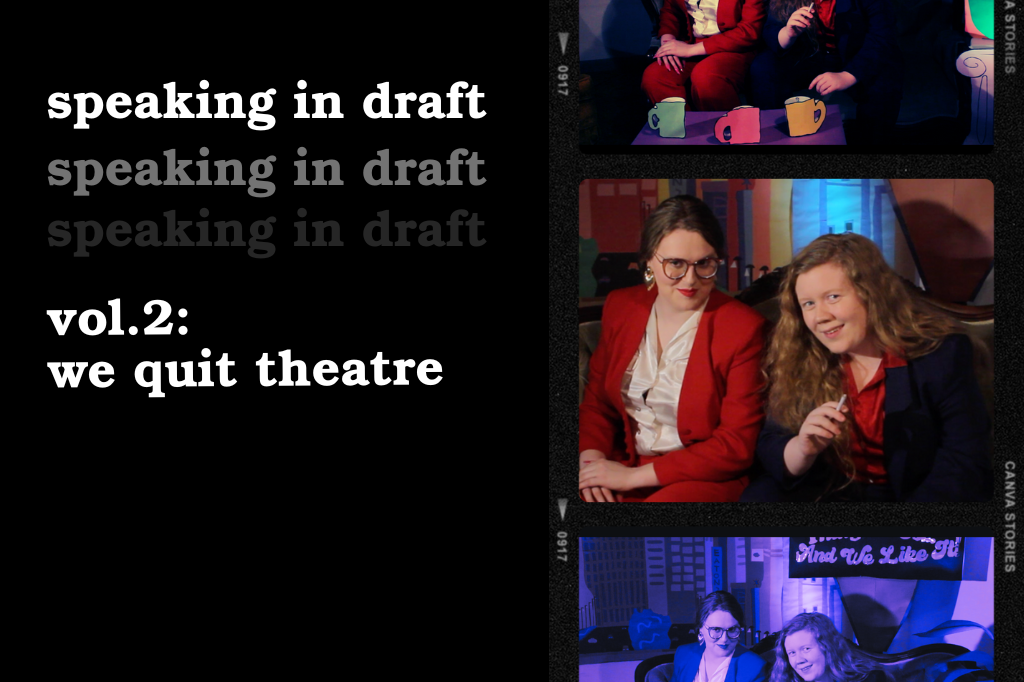
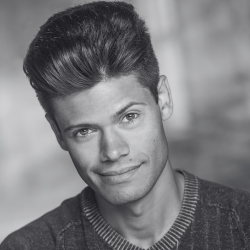
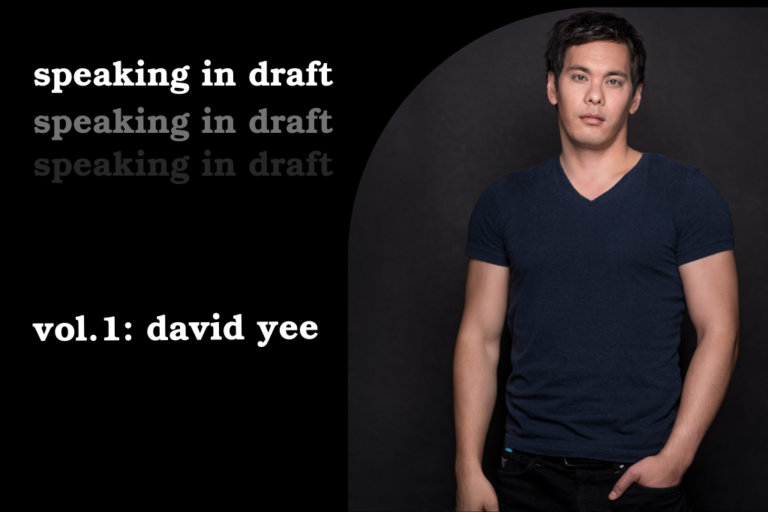
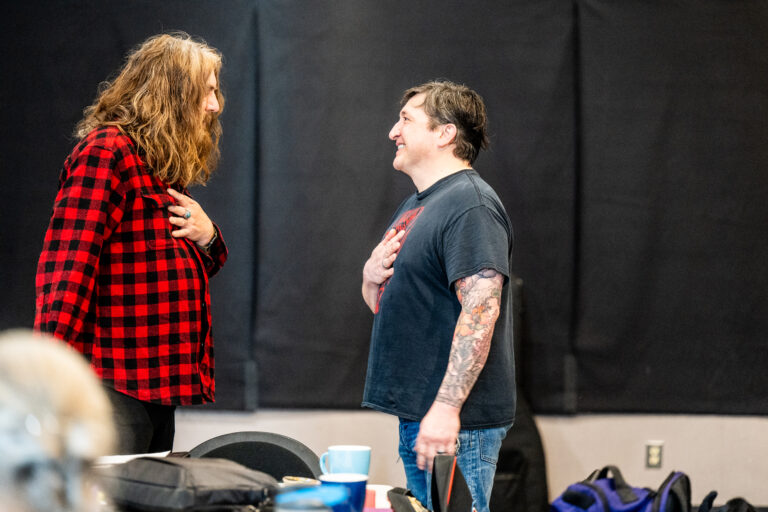
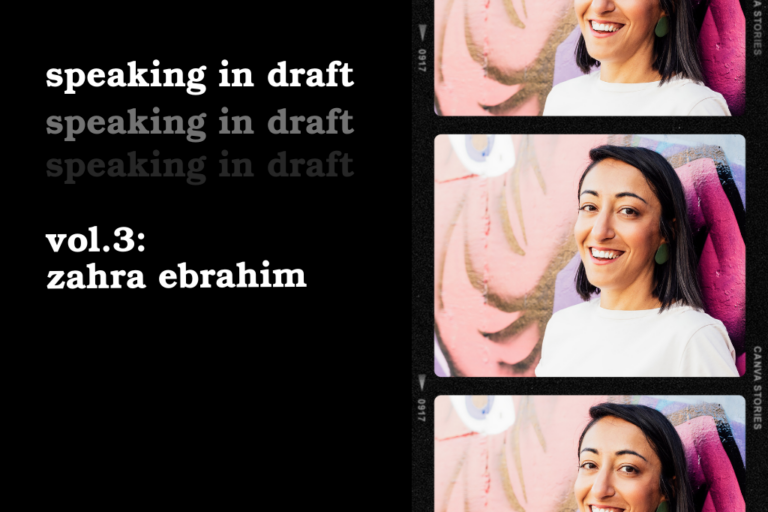
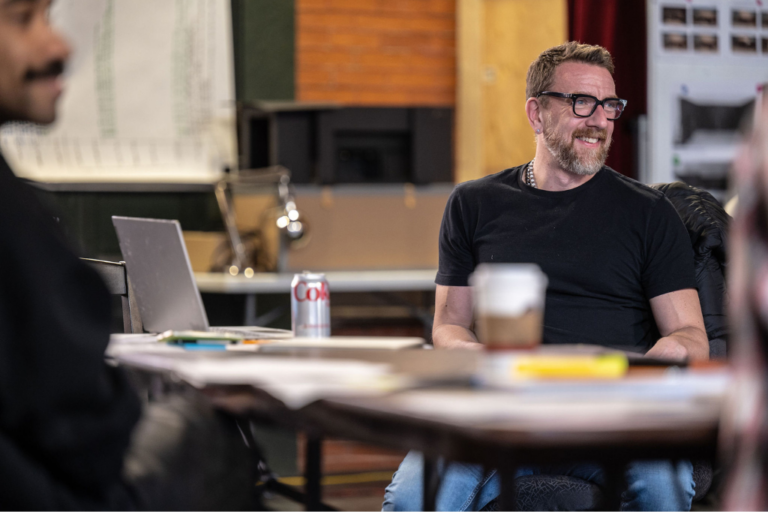
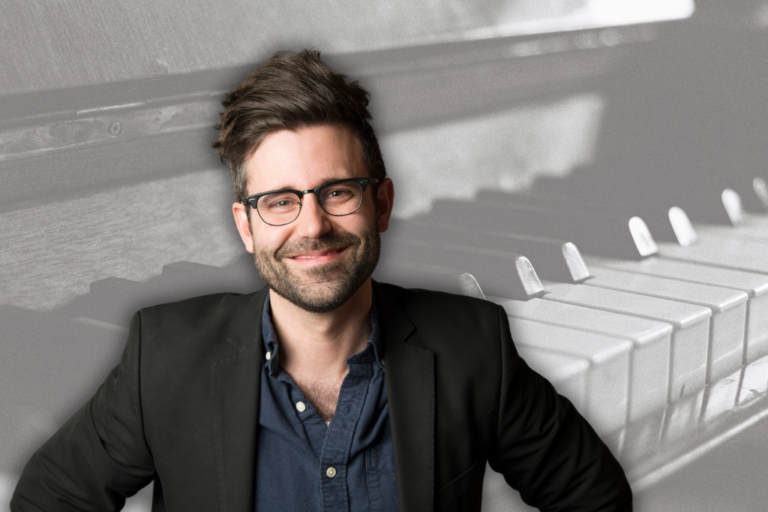

Comments